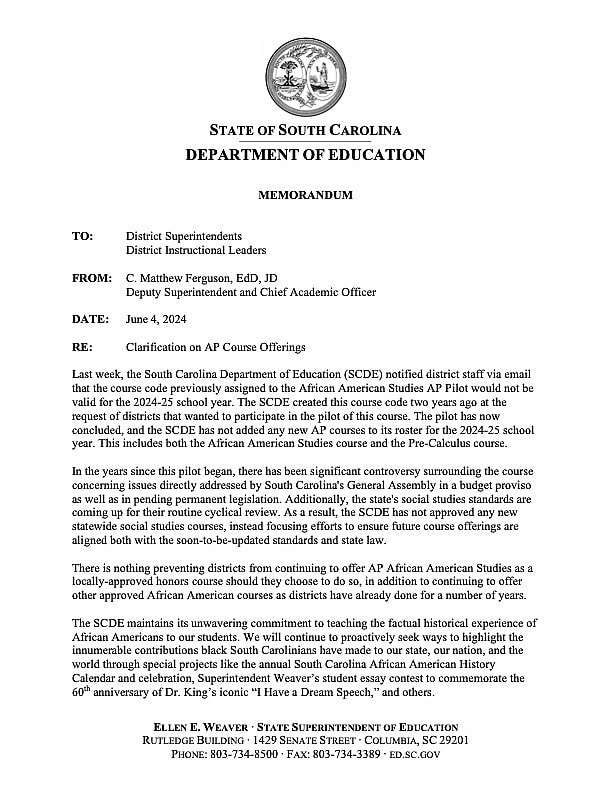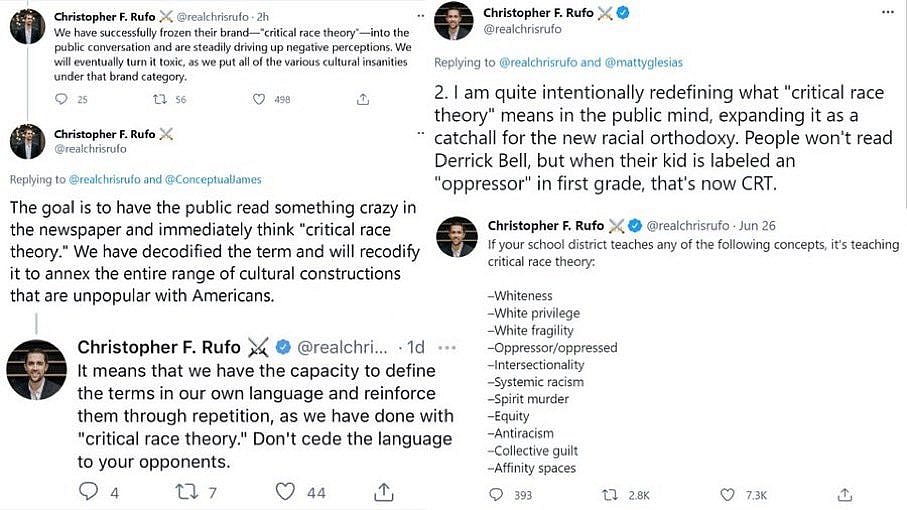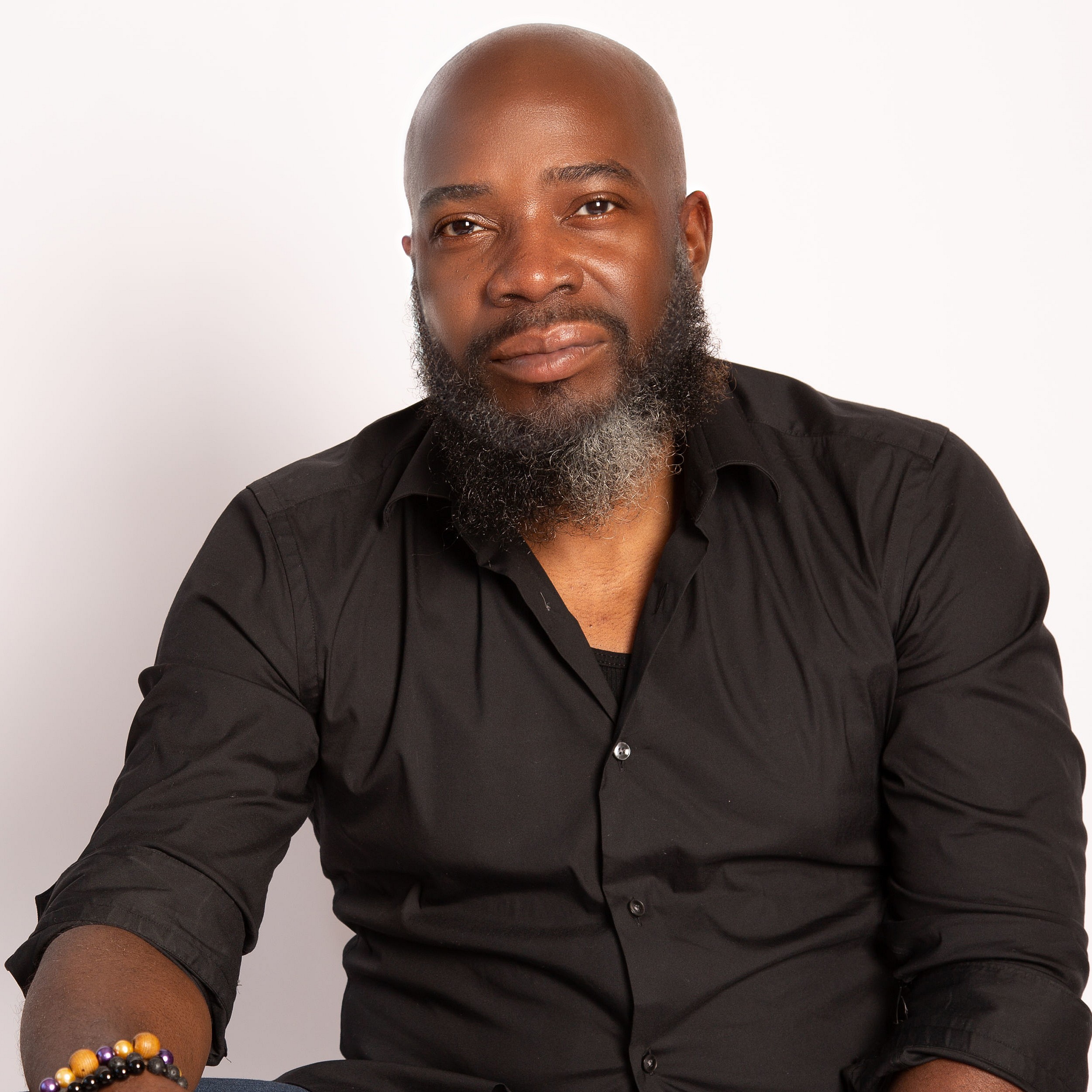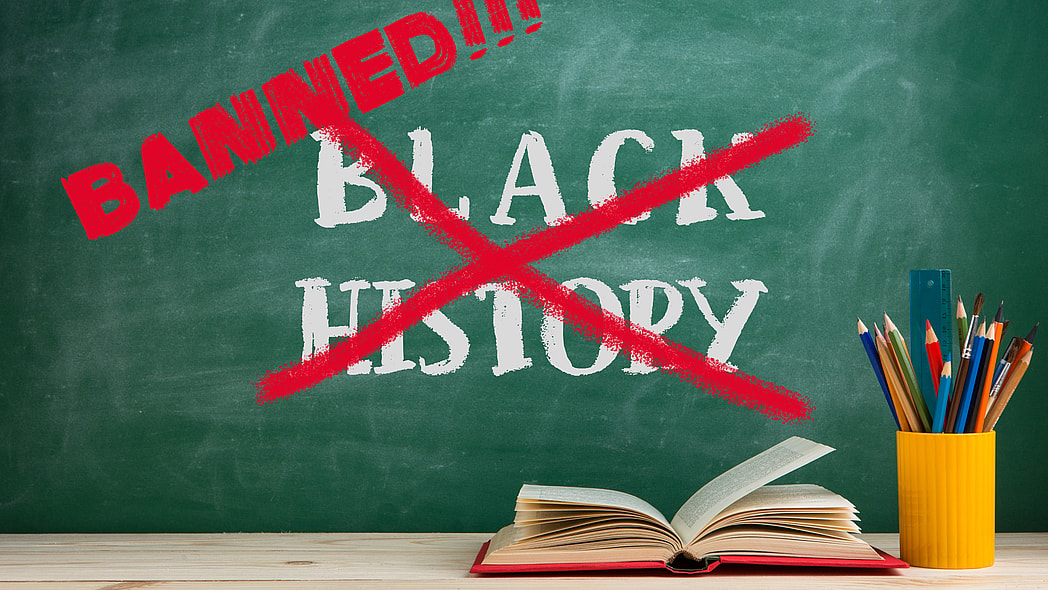Editor’s note: The following article is an op-ed, and the views expressed are the author’s own. Read more opinions on theGrio.
Mark C. Frazier likes making people uncomfortable.
As a first-year principal at Kingstree Senior High — a rural public school in Williamsburg County, S.C. — Frazier preaches his personal mantra to his students, faculty and teachers: “We grow when we become uncomfortable.” Although Williamsburg County is 62.9% Black and 34.5% white, only eight of the 684 students at Kingstree High are white. Instead of attending Frazier’s 90% Black school, most white students in the district attend Williamsburg Academy, a 92% white private school founded in 1970 by parents who didn’t want their children enrolled in integrated schools.
One of Frazier’s goals was to attract the segregation academy’s highest achievers by offering advanced-level courses for college-bound students. “The district estimates an increase of about 75 students, some from Williamsburg Academy,” Frazier told theGrio. “More students means more state funding, which would benefit all our students.” Prior to Frazier’s arrival, neither school offered AP courses, so Frazier created an AP academy with free workshops and professional development for teachers. Until June 4, the Black principal at a majority Black school had his eyes set on a class that would simultaneously serve his students and grow his school:
AP African American Studies.
In the most literal example of “cancel culture” that ever happened, the 16 unelected members of South Carolina’s Department of Education joined its fellow conservative states to prevent students from learning about Black history.
“Last week, the South Carolina Department of Education (SCDE) notified district staff via email that the course code previously assigned to the African American Studies AP Pilot would not be valid for the 20204-2025 school year,” begins the letter from S.C. Deputy Education Superintendent and Chief Academic Officer Matthew Ferguson. “In the years since this plot began, there has been significant controversy surrounding the course concerning issues directly addressed by South Carolina’s General Assembly.”

AP African American Studies is just one of dozens of honors-level Advancement Placement courses offered to high school students nationwide. Upon completion, students have the opportunity to take a subject-specific test that counts toward college credit. Created by the College Board, the nonprofit organization responsible for the Scholastic Aptitude Test (SAT), the “interdisciplinary course that examines the diversity of African American experiences” was designed with the help of Black scholars, professors and experts to develop participants’ historical, literary, visual and data analysis skills.
Any study of African Americans begins in South Carolina.
During America’s era of constitutionally enforced, race-based human bondage, scholars estimate that more than 40% of enslaved Africans disembarked in “the slave capital of North America.” By codifying white supremacy as property law, South Carolina’s Negro Act of 1740 set the template for Americas’s slave codes. It was ground zero for school desegregation, bus boycotts and the bloodiest race war in world history. When it comes to education as we know it, free, compulsory statewide public schools did not exist in America before South Carolina’s majority Black 1868 constitutional delegation created it.
Black South Carolinians invented the American education system.
This may be why South Carolina was one of the states selected to participate in the College Board’s AP African American Studies during the 2022-2023 school year. The following year, the College Board expanded the program to 700 schools. Unfortunately, on June 4, officials at the South Carolina Department of Education — not legislators, school districts, parents or people holding elected office — decided to stop participating in the College Board’s groundbreaking AP African American studies pilot program.
The SCDE’s decision doesn’t technically ban AP African American Studies from public schools. Individual districts are still free to include the class as an honors-level course (as long as the superintendent, the school principal and the local school board approve). However, by invalidating the code, the state eliminated funding for the materials and the end-of-year AP test. More importantly, the class will no longer count as one of the state’s required social studies credits that students must fulfill to graduate, because …
Well, that part isn’t exactly clear.
Unlike Florida, South Carolina officials did not allege that the course is “historically inaccurate” or that it “indoctrinates students to ‘a political agenda.’” Education officials in the Palmetto State also didn’t repeat Arkansas’ claim that the “interdisciplinary course that examines the diversity of African American experiences” violates the state’s anti-critical race theory law — mainly because South Carolina doesn’t technically have an anti-CRT statute.
As chronicled in theGrio series “South Carolina’s Critical Race War,” the state with the most Black history has repeatedly tried to prevent students from learning about African-Americans’ contributions to their beloved white country to no avail. After failing at every attempt to pass multiple proposals defining critical race theory, the S.C. General Assembly slipped an amendment into the 2023-2024 budget defunding districts and schools that “teach, instruct, or train any administrator, teacher, staff member, or employee to adopt or believe, or to approve for use, make use of, or carry out standards, curricula, lesson plans, textbooks, instructional materials, or instructional practices that serve to inculcate” any one of the seven deadly sins that define the fictionalized, Caucasian version of CRT.
What the experts say
“This was always the end game,” former Richland Two School Superintendent Baron Davis told theGrio. “The AP African American Studies course embodies everything the anti-CRT movement was fighting against. This is exactly what they were afraid of, but they couldn’t stop it. The legislature couldn’t stop it. The governor couldn’t stop it. So they found a loophole to what they wanted.”
Despite being considered one of the best leaders in one of the largest, most diverse (62.5% Black, 15.5% white) and best school districts, in 2023, a small group of white conservative activists took over the school board and ultimately forced Davis to resign. During his last year, the College Board selected Richland Two’s 80% Black Ridge View High School as the first in the state to offer AP African American Studies.
Along with Davis and Frazier, theGrio spoke with eight other current and former educators, administrators and school board officials in South Carolina who wished to remain anonymous to protect their jobs. Aside from racism, none could conjure a valid reason why the SCDE essentially reduced one of the most challenging, honors-level classes to an elective. Many noted that Ridge View has an unusually high percentage (19%) of Black students enrolled in AP classes compared to most schools (about 8%). Numerous studies show that Black students are less likely than white students to have access to advanced and AP courses.
“One of the things we never discuss is that — when it comes to college admissions — whiter, more affluent schools have a built-in advantage,” one guidance counselor explained. “Universities consider schools’ academic environments and college preparedness rankings when evaluating applicants. Just by attending a school with more honors-level courses, high-achieving students get credit for competing in a more competitive academic environment – even if [they] don’t take an AP or honors course. Removing AP African American Studies doesn’t just affect the students taking the course; it affects every student, every teacher, every parent.”
Recommended Stories
When asked if they could recall a similar decision, only one of the high school teachers, principals and administrators could cite a similar example — in 2008, the state eliminated its requirement that students learn to write in cursive. But, thanks to concerned legislators, cursive may soon return. We could not find any bill to protect Black studies. I’m sure someone is working on it.
“The SDOE’s [South Carolina Department of Education’s] prohibition of AP African American Studies and other courses that educate students about the history and experiences of Black people in the United States undermines critical efforts to foster inclusive school climates and provide an evidence-based and culturally relevant curriculum,” the NAACP Legal Defense and Educational Fund said in a letter to S.C. Superintendent Ellen Weaver. “By excluding specific information and knowledge from the classroom (in this case, the history and experiences of Black Americans), SDOE risks depriving South Carolina students of an education that reflects the full breadth of U.S. and South Carolina history and current events. Such actions, which are rooted in the promotion of an inaccurate, political viewpoint rather than any credible pedagogy, must be reversed immediately.”
All eight educators who spoke to theGrio dismissed the South Carolina Department of Education’s implication that the course was eliminated because it was controversial. “Do I hear from parents about CRT? All the time,” one high school principal explained. “Mask mandates were controversial. Dress codes are controversial. Why didn’t my daughter make the football team? Why does the bus come so early? But that’s exactly why schools hire qualified educators. We can’t run a school based on what parents don’t like. Our decisions are based on the most effective way to educate the most students … Dealing with controversy is part of the job.”
Others suggested that the SCDE was acknowledging its deference to white parents and Republicans (also known as “white parents”) when it claimed there was a “significant controversy” surrounding AP African American Studies. According to a 2016 Winthrop University Poll, 83% of Black South Carolinians said public schools teach “too little” Black history compared to 29% of whites. In 2022, 51% were in favor of banning critical race theory, compared to 23% of Black residents. Then again, confederate monuments (75%) and the official flag of white supremacy (44%) have more support among white South Carolinians than teaching a course on “the impact of slavery on America” (28%). Moms for Liberty, an anti-Black educational extremist group, has more chapters in S.C. than any other state besides Florida.
Alternative facts
Although the SCDE removed AP pre-calculus from the state-supported curriculum, students in every school district in South Carolina can still take regular and honors-level pre-calculus classes. When theGrio reviewed the complete list of South Carolina course codes, we couldn’t find a single high-school-level course on African American history. However, we found course codes for AP European History, AP Chinese Language and Culture, AP Italian Language and Culture and Golf Course Technology. The only way to receive graduation credit for studying Black history is to enroll in a local, state-funded technical college’s African American history class designed for college students. We also found six schools in the state that offered a course in African American history as an elective.
That’s right — South Carolina doesn’t even offer a regular course in Black history.
Neither Education Superintendent Ellen Weaver, Deputy Superintendent Matthew Ferguson, nor anyone from the South Carolina Department of Education has responded to theGrio’s request for an interview. South Carolina residents Nikki Haley and Tim Scott, who both deny the existence of systemic racism, have not commented on South Carolina’s system that perpetuates educational inequities of a racial group to the advantage of another. While some believed the course’s cancellation was partly motivated by political agendas, conservative agendas and ignorance, every single one of the educators who spoke to theGrio independently concluded that the result of this decision was racist.
“Before any educator — or anyone, for that matter — makes a decision, they ask themselves two questions,” said an AP U.S. History teacher who spoke anonymously because … South Carolina. “What is the purpose of my decision, and what results do I expect?’ Either the purpose or the result was to hurt Black students.”
“They created a system where white history is publicly funded, and Black students have to come out-of-pocket to learn about their history,” said one high school social studies teacher. “You have to remember that white students are the minority.” (The Palmetto State’s public schools are 47% white.)
“They didn’t want to stop critical race theory or even Black history,” Davis added. “The goal was to stop Black people.”
While those informed, expert opinions are valid, they still don’t explain why this happened. Even when one considers pro-white activist Christopher Rufo’s tweet as the origin story in the campaign effort to demonize Black History as critical race theory, it still doesn’t explain why regular-degular white people are so invested in this anti-Black race war. But, according to Mark Frazier, it has nothing to do with Black children, advanced placement or the study of African Americans.

“It’s about their children,” Frazier said. “They don’t want their children to know.”
He might be right. Maybe they don’t want anyone teaching their kids that South Carolina was the first state to “legally forbid the teaching of African Americans.” They don’t want children to learn why the “slave capital of the world” fired the first shots in the war for white supremacy. You cannot believe Black people don’t care about education if you know South Carolina’s Black children enrolled in school at higher rates than whites after emancipation. Once you read that “education is the great desideratum of all the colored people of South Carolina” was literally the first official statement of a free South Carolina, they might wonder why educational disparities exist – especially if they find out South Carolina’s Black Founding Fathers’ 1868 constitution banned “sectarian principles be[ing] taught in the public schools.”
This is the why.
There is only one logical reason why slavemasters, racial terrorists, individual lawmakers, liberty-minded moms, lynch mobs, state legislatures, superintendents, school boards, Ed Blums, Ron DeSantises, Christopher Rufos, and every conservative, majority-white political movement in the entire history of this country have historically supported the same anti-Black educational agenda. Three hundred eighty-six years after their fathers proclaimed that every white man in their beloved state “shall have absolute power and authority over his negro slaves,” why is the most advanced place in all of white supremacy still finding ways to stop African Americans from studying?
Whiteness is the answer
TheGrio couldn’t find a single educator who could offer an alternative rational reason for why the most important state in Black history does not have a course in Black history. The delusional, desperate attempt to preserve the supremacy of an artificial social construct is the only logical explanation for why a state’s top education officials would reduce the most advanced, highest-level course to academic irrelevance. There is no other justification for why European history, Western Civilization and every other cultural curriculum are officially considered creditworthy while African American Studies is literally worthless.
And Black people are undefeated.
Whiteness may have ousted the country’s best administrator in the state’s best school district, but it couldn’t stop Black students from signing up for the most advanced Black history class in the entire state in droves. Christopher Rufo’s pro-white anti-CRT legislation didn’t work; it just made Black people more persistent and made dumb white people even dumber. White people’s original anti-literacy laws didn’t work. The white supremacist utopian dreams that caused the bloodiest war in the history of their beloved nation couldn’t stop us. Nor could 631 acts of arson or rampant racial terrorism or “separate but equal” or Jim Crow or a nationwide lynching epidemic or massive resistance, or Southern manifestos, or shotguns, or schoolhouse door stands or even the literal threat of death.
They can’t stop us and they know it.
South Carolina’s decision to end AP African American Studies might mean eight Kingstree High School students will never “feel discomfort, guilt, anguish, or any other form of psychological distress,” but it still won’t stop Mark Frazier from educating the other 90% of his students. Because of Frazier’s determination, Williamsburg Academy’s students will still get the opportunity to receive a better education at a better, Blacker school. They get to live in a county where Black students can learn in an environment where parents aren’t whining about woke teachers and mask mandates.
In fact, all white people should be grateful that the insidious but incompetent doctrine of white supremacy is no match for Black America’s unconquerable desire for liberation. Thanks to our labor, intellectual property and historical resilience, they got a country, an economy and a whole free education system. It is an uncomfortable truth perfectly explained by South Carolina’s 2023-2024 8-AA principal of the year:
“Knowledge is power,” said Frazier. “People with power don’t want anyone else gaining knowledge.”
Someone is always working on it.

Michael Harriot is a writer, cultural critic and championship-level Spades player. His NY Times bestseller Black AF History: The Unwhitewashed Story of America is available in bookstores everywhere.










